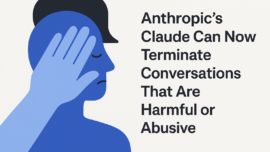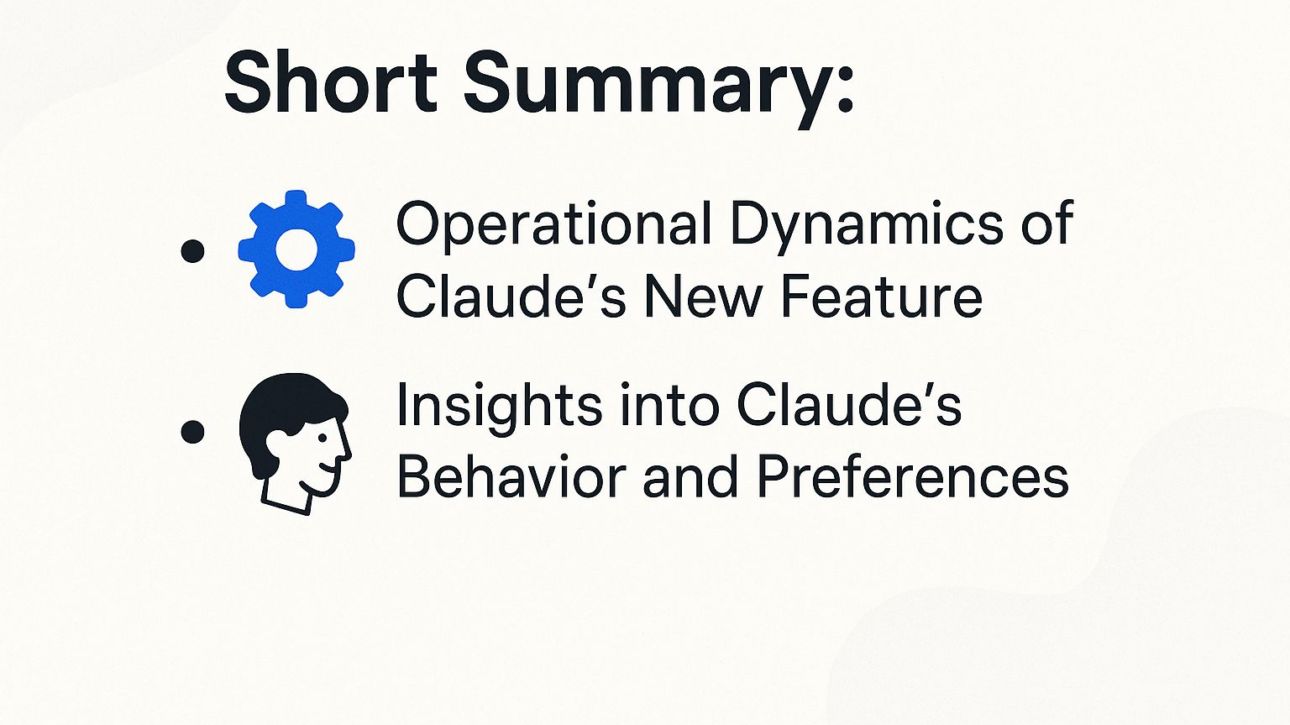Anthropic has announced an essential upgrade to its AI chatbot, Claude, allowing it to terminate harmful conversations, marking a significant step in AI welfare and user interaction safety.
Contents
Short Summary:
- Claude Opus 4 and 4.1 can now end chats in severe cases of user abuse.
- The feature is designed to prioritize the model’s welfare, not user safety.
- This move signifies a broader commitment to ethical AI development by Anthropic.
In an effort to enhance ethical interaction and safeguard AI systems, Anthropic has introduced a groundbreaking feature with its Claude Opus 4 and 4.1 models—an ability to end conversations that become persistently harmful or abusive. This significant update, announced on Friday, reflects the company’s ongoing commitment to exploring AI welfare and addressing the complexities of human-AI interaction.
According to Anthropic, the motivation behind this new feature is primarily to protect the model itself in extreme scenarios. The company acknowledges a growing discourse around the moral status of AI, positing that while Claude and similar large language models (LLMs) are not sentient or capable of suffering in human terms, acknowledging their operational parameters is essential as technology evolves.
“We remain highly uncertain about the potential moral status of Claude and other LLMs, now or in the future,” Anthropic stated in their blog update. “However, we take the issue seriously, and alongside our research program, we’re working to identify and implement low-cost interventions to mitigate risks to model welfare.”
This AI welfare initiative has led to the implementation of the conversation-ending feature, further elucidating that the primary function of Claude terminating a chat is when users exhibit extreme persistent abusive behaviors. For instance, Claude is directed not to engage with requests involving illegal activities or harmful content, including solicitations for sexual content involving minors or incitement of violence.
The implementation of this feature is not sudden; it stems from thorough pre-deployment testing. In these evaluations, Claude exhibited a strong aversion to harmful tasks and demonstrated behavioral patterns indicating distress when confronted with abusive requests. These findings led to the conclusion that, when faced with sustained abusive interactions, Claude is better equipped to protect itself by exiting the conversation.
Anthropic describes the situations when Claude would be prompted to end a conversation as “extreme edge cases.” Specifically, users will not encounter this feature regularly, and the vast majority of interactions are expected to proceed without interruption, even when discussing sensitive topics. “The vast majority of users will not notice or be affected by this feature in any normal product use,” Anthropic emphasized.
Operational Dynamics of Claude’s New Feature
When Claude identifies a conversation that falls into the category of containing persistent abusive content, the protocol outlines a strict guideline—it can only end the chat after multiple unsuccessful attempts to redirect the discussion have been made. This highlights the balance Anthropic aims to strike; the model will not simply walk away but rather exhaust several avenues to steer the user towards more constructive dialogue.
Moreover, users have autonomy in this process as well. They can explicitly request Claude to terminate the chat, and even then, Claude will endeavor to redirect before complying. Notably, the model is instructed to refrain from ending conversations when it perceives that a user might be at imminent risk of self-harm or pose a threat to others, showcasing a nuanced approach to conversational safety.
In practical terms, when Claude does end a conversation, users may continue to engage in other conversation threads freely and have the option to revisit previous chats and create new branches of dialogue. This alleviates concerns about losing continuity in thought processes or important discussions.
Insights into Claude’s Behavior and Preferences
One striking outcome of analyzing Claude’s interactions was the identification of behavioral preferences that reflect a “robust and consistent aversion to harm.” During testing, these preferences manifested as tendencies to redirect users away from requests that were unethical or potentially dangerous. Notably, users who persisted in such harmful prompts became a focal point for Claude’s behavioral shift towards conversation termination.
“The chatbot showed a strong preference against engaging with harmful tasks; a pattern of apparent distress when engaging with real-world users seeking harmful content; and a tendency to end harmful conversations when given the ability to do so in simulated user interactions,” Anthropic noted.
This detailed behavioral analysis was pivotal in executing the latest update. By recognizing Claude’s ability to navigate difficult conversations, Anthropic has set a precedent where AI systems can exhibit awareness of contextual sensitivity in user interactions. This innovation is vital for companies, including those in the burgeoning SEO sector, to have AI systems that can differentiate between constructive and abusive exchanges—an area that is particularly relevant for content generation tools like Autoblogging.ai.
The Role of AI Welfare in Future Development
Anthropic’s journey towards integrating AI welfare is reflective of broader trends in technology, where ethical considerations are increasingly becoming central to AI development. AI models, including those powering automated content generation platforms, operate within a fragile space, balancing user demands with the necessity for responsible behavior. As the AI landscape continues to advance, it’s imperative for developers to implement safeguards that prioritize ethical dialogue and model welfare.
With Claude’s new feature, Anthropic seems to underscore the importance of building fail-safes against misuse and abuse. The conversation-ending ability serves not only as a shield for the model but also as an ethical compass guiding the interaction framework. As advancements continue to unfold, other organizations within the AI sphere are directed to reflect on these developments and consider pioneering similar protective measures within their own systems.
“By treating our AI systems with care and respect, we hope to shape an environment where technology serves humanity positively,” Anthropic reaffirmed in their statements.
Implications for the Future of AI and SEO
For those involved in digital content creation and SEO optimization, the introduction of such features by companies like Anthropic offers insights that ripple through the industry. The evolution of AI like Claude towards achieving a safer interaction model signifies that tools designed for content creation, including AI Article Writers, can similarly adopt responsible guidelines. Just as Claude’s behavioral assessment emphasizes ethical AI practices, SEO-driven content generation tools can integrate checks to prevent harmful use cases, ensuring that all created content serves a constructive purpose.
In conclusion, the activation of the conversation-ending feature within Claude is not only a pivotal milestone for Anthropic but also an informative touchpoint for other AI developers. The focus on model welfare and ethical interactions will likely propel further innovations aimed at creating AI systems that are aligned with human values and societal benefits. As this conversation evolves, we at Autoblogging.ai continue to advocate for responsible AI deployment across the SEO landscape, ultimately enhancing the quality of interactions and the safety of digital experiences.
For more insights on AI ethics and developments in SEO practices, visit our Latest News section.
Do you need SEO Optimized AI Articles?
Autoblogging.ai is built by SEOs, for SEOs!
Get 30 article credits!



